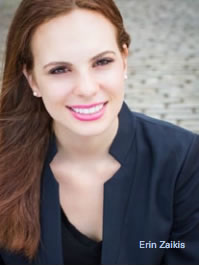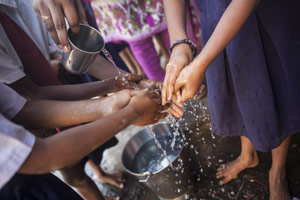By Mandira Banerjee for Global Michigan and Michigan Today
As Erin Zaikis (BA ’11) lay sick with dengue fever in a Thailand hospital in 2013, she had an epiphany. She wanted to dedicate her life to helping others. Confined to her hospital bed with little to do, she ran through images of the rural Thai children she’d met while volunteering with the Jewish aid group Justifi.
One recurring detail stuck out from the rest: “They would use the bathroom and not wash their hands afterwards,” says Zaikis. “I asked them what they would use [to wash] in the shower. They told me they just used just water, and talcum powder to absorb sweat.”
So one day Zaikis brought the children soap. “But they didn’t know what to do with it,” she says. ”For many of these children, some as old as 13, it was the first time they had ever washed their hands with soap.
“I couldn’t believe it. I was 23 at the time and had lived my whole life without ever thinking about soap. Then I discovered that not everyone is lucky enough to take soap for granted.”
Approximately 3.5 million children die of diarrhea and respiratory diseases each year, according to the Centers of Disease Control. Hand washing is the best way to prevent these deaths.
 |
Rinse and repeat
Once fully recovered from dengue and back in New York, Zaikis began to brainstorm ideas about producing soap and promoting hygiene. She founded a soap-making operation named Sundara, a Sanskrit word for beautiful, and set about crafting her own soaps in her tiny New York kitchen with the goal of raising money for schools like the one in Thailand.
While her initial soap-making attempts didn’t go well, Zaikis soon hit upon the concept of recycling hotel soaps, so often discarded after just a few uses. She just had to figure out how to collect the soaps, recycle them, and provide them to people in need.
She narrowed her focus to India, the site of her first internship while studying at Michigan. Inspired by a global poverty course, Zaikis had traveled to Mumbai in 2009 where she spent a summer working in a girls’ orphanage.
“It was intense,” she says. “I decided the next time I went back to India I had to go with a way to alleviate some of the suffering I’d seen.”
And with Sundara, she’d found that way. “Sanitation and hygiene issues in India are incredibly important, yet usually overlooked and underfunded,” Zaikis says.
She dived into the soap recycling project, but soon grew discouraged when she could locate only a few organizations that actually recycled soap. One was based in Hong Kong and the others were in the U.S. To avoid the high cost of shipping to India, Zaikis realized a local operation was the only way to go. And if one didn’t exist, she would have to create it.
Hope in a soap
In the spring of 2014, Zaikis won a LinkedIn for Good competition and grant, which allowed her to launch a soap-recycling operation in India. She wanted to partner with local nonprofits in Mumbai to lend her new organization some critical credibility.
“Hygiene education is a sensitive topic in any culture,” she says. “We can reduce that sensitivity when the lessons are coming from people that look like you and speak the same language, who have had similar life experiences.”
She turned to the U-M alumni network for help, and connected with Ross School graduates Sanjay Mirchandani, MBA ’89, CEO of construction and development company Mirchandani Group, and Bharat Govinda, MBA ’02, a senior insurance industry executive. Both responded immediately. They reviewed her business plans, offered suggestions, and opened the doors to hotels, nonprofits, and local women’s organizations.
Helping hands
As momentum picked up, Zaikis established the nonprofit arm of Sundara, partnering with local nonprofits Reap and Gabriel Project Mumbai. She connected with 10 boutique hotels and such major fivestar resorts as the Taj Mahal, Four Seasons, Leela, and Mirador. Each week, the hotels provide more than 100 pounds of discarded soap for recycling.
Once the soaps are collected, Sundara’s staff uses vegetable peelers to remove outer layers from the bar, soaks the remaining soap in a mix of bleach and water, sanitizes it with pressure, and cuts it into new bars for distribution. All of this work is done by hand by local women who are paid three times the average wage.
“For many of these women, it is the first job they’ve ever had. We are proud to be able to provide them with dignified employment – which unfortunately is a rarity for many of India’s poor,” Zaikis says. Sundara has produced and distributed more than 6,000 bars of recycled soap to date, employs 17 teachers who conduct hygiene workshops at 30 schools in Mumbai and surrounding areas, and is in the process of expanding its soap-making and recycling programs to Uganda.
Zaikis says the Ford School’s policy curriculum was helpful in almost every aspect of starting and running Sundara. She credits the courses that opened her eyes to injustice and inequality, the training that allowed her to view controversial issues from all sides, and the written and oral communication instruction that has allowed her to present her case clearly and confidently.
“Perhaps most importantly,” says Zaikis, “I was able to go to class every day with 50 talented, passionate individuals, who I have stayed in touch with as they have gone on to lead inspiring careers of their own.”
For more information about Sundara, visit www.sundarafund.org
Below is a formatted version of this article from State & Hill, the magazine of the Ford School. View the entire Spring 2015 State & Hill here.
